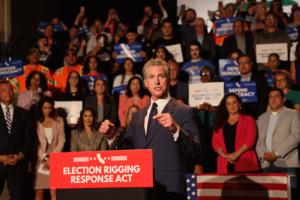Politics
/ArcaMax

Commentary: Trump's Russia and Ukraine summits show he can push for peace
By hosting an unprecedented short-notice summit with Ukraine’s President Volodymyr Zelenskyy and key European leaders on Monday, President Donald Trump significantly raised the prospects for ending Russia’s three-and-a-half-year-long war against Ukraine.
The vibe at the opening was affable and positive. The participants genuinely looked ...Read more

Editorial: American resolve is vital to Trump diplomatic efforts
President Donald Trump’s diplomatic efforts to stop the Ukraine conflict remain fluid, the details murky. But the fact that the president has in the span of only a few days met with Russian leader Vladimir Putin, Ukrainian President Volodymyr Zelenskyy and several European leaders in an attempt to end the hostilities is a credit to the White ...Read more

Editorial: Allies to the rescue -- European leaders try to keep Trump on the correct side in Ukraine/Russia war
It’s not often that you have eight European leaders, including one whose country is at war, descend on Washington in as close to an unplanned snap visit as you can get. Let’s hope that the White House visit convinced the White House resident of the importance of the moment.
Monday afternoon, Ukrainian President Volodymyr Zelenskyy was ...Read more

Mark Z. Barabak: Power grab may energize Newsom and Democrats. But it won't fix their bigger problem
Today we discuss flora, fauna and self-gratification.
You’ve been away.
Yes, I was living in a tent for two weeks, communing with the pine trees and black bears of the Sierra.
You heard about California’s likely special election?
I did.
It seems Gov. Gavin Newsom will have his way, with help from the Democratic-run Legislature, and ...Read more

David Mastio: Russia is happy to wait while Trump flails and fails on Ukraine peace
The Washington President Donald Trump has created is a hall of carnival mirrors where up is down and you never know just how much reality — and what was once America’s basic morality — are being distorted.
While Trump was in the White House being repeatedly thanked by Ukrainian President Volodymyr Zelenskyy for selling out the country’s...Read more

David M. Drucker: Crime stats aren't the best way to make people feel safe
On an evening in late July, just blocks from the Washington, DC, rowhouse my wife and I share with our two boys, a shootout erupted between two groups of people. Injuries resulted; cars and homes were riddled with bullets and police determined more than 140 shots were fired.
With criminal activity like this still a daily fact of life in the ...Read more

POINT: Local problems need local policing, not federal military force
Using federal law enforcement and military troops to enforce law and order in Washington may be well-intentioned, but history and experience suggest it is counterproductive. Rather than promoting peace, such deployments often undermine trust, escalate tensions and erode civil liberties.
Military and federal involvement in domestic policing has ...Read more

Editorial: Artificial intelligence meets fried chicken at Wingstop
At a moment when artificial intelligence is progressing at a rapid rate and the job market is tightening, one fast-food chain offers a glimpse into how everyday businesses are adopting AI to improve efficiency — and reduce their workforce.
By the end of this year, Wingstop expects its 2,000-plus stores across the U.S. to be using its new AI-...Read more

Commentary: A trip to Iceland reminded me that the American Dream still begins at home
Debates over immigration policy are such a fixture of our politics that we often overlook the reason we have them: Because the United States is the most sought-after place on Earth to build a future. Cynics may sneer, but America’s unique ability to offer a path to possibility for all is a powerful draw for non-citizens.
At the heart of that ...Read more

Adam Minter: Jim Harbaugh is an even bigger PR headache for the NFL now
The National Collegiate Athletic Association levied millions of dollars in fines against the University of Michigan for the sign-stealing scandal that took place under former head football coach Jim Harbaugh. The school will appeal, but even if it succeeds, the taint of the well-documented controversy will remain for years.
That’s no problem ...Read more

Commentary: Celebrating National Black Business Month
Every August, National Black Business Month rolls around, and for a few weeks, social media lights up with hashtags and well-meaning posts about supporting Black-owned businesses. You'll see lists pop up—restaurants, bookstores, clothing lines—all run by Black entrepreneurs. Maybe your favorite coffee shop puts up a sign, or a big brand ...Read more

COUNTERPOINT: Domestic tranquility -- A shared federal responsibility
When you have lived most of your years within an institution, you may be able to see only what the institution has been, not what it must now become.
So, for example, even though elected and appointed federal officials take an oath to support and defend the Constitution “against all enemies, foreign and domestic,” a military experience ...Read more

Commentary: Black people on campuses support fighting antisemitism and also wonder, 'What about us?'
Antisemitism is abhorrent. No Jewish person should ever experience it, and universities must do all they can to eradicate it on campuses.
The Trump administration is pushing colleges and universities to address antisemitism by threatening, freezing and revoking federal funding and demanding millions of dollars to settle allegations — or in ...Read more

Commentary: Is Trump normalizing military occupation of American cities?
President Donald Trump’s military interventions in Los Angeles and Washington, D.C., foretell his plan for other cities.
The Washington Post recently reported on the Pentagon’s plans for a “quick reaction force” to deploy amid civil unrest. And, broad mobilization of the military on U.S. soil could happen under the Insurrection Act, ...Read more

Editorial: Ideological diversion treated as a social risk
Critics have long contended that the progressive authoritarianism dominating college campuses is antithetical to open discourse and intellectual growth. A study confirms those suspicions.
Researchers at Northwestern recently announced the results of a two-year study in which they conducted interviews with more than 1,400 students on their own ...Read more

Editorial: After a disastrous Alaska summit, a feeble Trump looks poised to complete his sellout of Ukraine
President Donald Trump’s Alaska summit with Russian tyrant Vladimir Putin was an epic failure on several fronts.
Now, he appears poised to complete the sellout of Ukraine. In doing so, he will abandon Europe and open the door for China to invade Taiwan. Worst of all, Trump continues to show the world that he is a paper tiger.
Could Trump ...Read more

Michael Hiltzik: Trump wants NASA to burn a crucial satellite to cinders, killing research into climate change
By any reasonable metric, NASA's Orbiting Carbon Observatory has been a spectacular success. Originally designed to support a two-year pilot project, it has been operating continuously in space for more than 10 years and could continue doing so for three decades more.
The data it produces "are of exceptionally high quality," NASA stated in a ...Read more

Editorial: Democrats keep cozying up to NYC's Mamdani
Ideas have consequences. And the consequences of socialism are extremely destructive.
Socialist Zohran Mamdani continues to be the clear front-runner to be the next mayor of New York City. He hasn’t been shy about his hard-left positions.
He wants to “freeze the rent” and create “city-owned grocery stores,” according to his campaign...Read more

Editorial: Who's afraid of a healthy school lunch?
In Japan, most schools serve freshly prepared, nutritionally balanced lunches — often rice, fish or meat, soup and vegetables. French cafeterias typically offer multi-course meals that might include salad, a main dish, bread, cheese and dessert.
By contrast, many Americans recall their own school lunches as far less appealing.
Some of us ...Read more

Commentary: Trump's claim of fighting antisemitism at UCLA is a dangerous charade
Days after UCLA settled a lawsuit brought by three Jewish students and a Jewish professor alleging antisemitism, the Trump administration announced that it would suspend $584 million in federal research grants to the institution, alleging failure to “promote a research environment free of antisemitism.” Pressing that case, the administration...Read more






















































